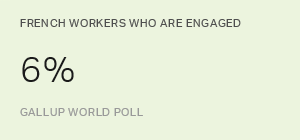As each new school year begins, many students dread the day when they have to give up their freedom. How many teachers share their apprehension? The authors of a new book, Teachers Have It Easy: The Big Sacrifices and Small Salaries of America's Teachers, make a compelling case that few jobs are as demanding as teaching -- and jobs that are tend to pay much more.
What do teachers think about their working conditions? ���۴�ýrecently conducted a series of focus groups and in-depth interviews with elementary and secondary school teachers to gain a better understanding of the workplace issues they face, discussing, among other things, the 12 questions that ���۴�ýhas determined are central to employee engagement across industries.
Teachers Love Their Work, but Need More Pay
For the most part, the teachers ���۴�ýspoke with wouldn't do anything other than teach. The most poignant endorsement came from a veteran California teacher who has spent the latter part of her career working with limited-English-speaking kids: "I'm retiring this year. I've taught 29½ years in five different schools … I love teaching, love working with teachers and, above all, love the kids. Surely few professions are as rewarding as teaching. Job satisfaction is something that I experience several times every hour."
However, the issue of low pay arose frequently in our conversations. One young Virginia teacher said, "I have to live with my mother because when I was living with two other people, I was broke within two weeks. Absolutely broke. And that's what we see happening all the time with the younger teachers. They're rooming with three or four people, or they're living in another county, they can't even live close to where their schools are."
They Know What's Expected, but Can They Do What They Do Best?
Item: I know what is expected of me at work.
Item: At work, I have the opportunity to do what I do best every day.
Discussions about two of Gallup's 12 employee engagement items offer insight into other aspects of a teacher's working environment that could be improved. While the teachers tended to say they understand what's expected of them, they didn't necessarily agree with these expectations, and some even described how these expectations impair their ability to do what they do best. A number of Virginia teachers said they feel stifled by their state's detailed Standards of Learning curricular requirement. They feel they no longer have the freedom to use their creativity and relationship-building talents to fully engage students in the learning process.
- High school teacher: "Although I believe that standardized tests are an important tool for schools, I resent the tendency to judge me, my students, and the level and result of our efforts by these tests. Are we to teach only those topics on the test? Should we spend the year only in test preparation? Would this improve education? What about the intangibles that we teach: self-sufficiency, honesty, cooperation, responsibility, diligence, etc.?"
- Middle school teacher: "Standards are good to have as a framework for understanding, but standardization puts a stranglehold on teachers and students. Why do we spend four years in college and two years in grad school to not be a professional?"
- High school teacher: "As people move on in experience and comfort level, they should be given more freedom. I consider it a truism that you will never have a situation where the student will be more enthused about a lesson than you are. So if you're not really that interested in it, if it just doesn't do anything for you, I would venture to guess that not a single student is going to be above whatever engagement level you're at."
Some teachers described the pressure of expectations from above and below -- administrators who want to make sure the standards are followed, and parents who want to make sure their children get good grades.
- High school teacher: "The teacher's head is in a noose in that when you look at the filter-down system, we are the ones responsible for the performance. At the end of each grading period, the principal will have a meeting with that teacher and the printout of all of your grades -- percentagewise, which students have done well and which have not. And then we are asked why didn't this student do well, why didn't that student do well?"
- High school teacher: "Teachers are not in a position to take risks anymore. The idea used to be that, if the student could at all learn in a particular environment, you moved her or him into that environment and gave them that opportunity. Now you have to ask yourself, 'Are they going to pass the test at the end? And if they don't, what's that going to do to me and the assessment of my performance?' And so now students are being kept back and kept in this cycle of mediocrity."
- One middle school history teacher complained he's no longer able to bring his topic to life by allowing students in his hometown of Pittsburgh to spend more time investigating local steel king Andrew Carnegie. "The things that are interesting to me in U.S. history and the people that actually love the subject matter are hardly touched upon," he says. Noting that day-by-day lesson plans are provided to him online, he adds, "It's like I can honestly teach an entire year without having an original thought."
Next week's article will look at the teachers' feelings about their relationships with principals and administrators.
